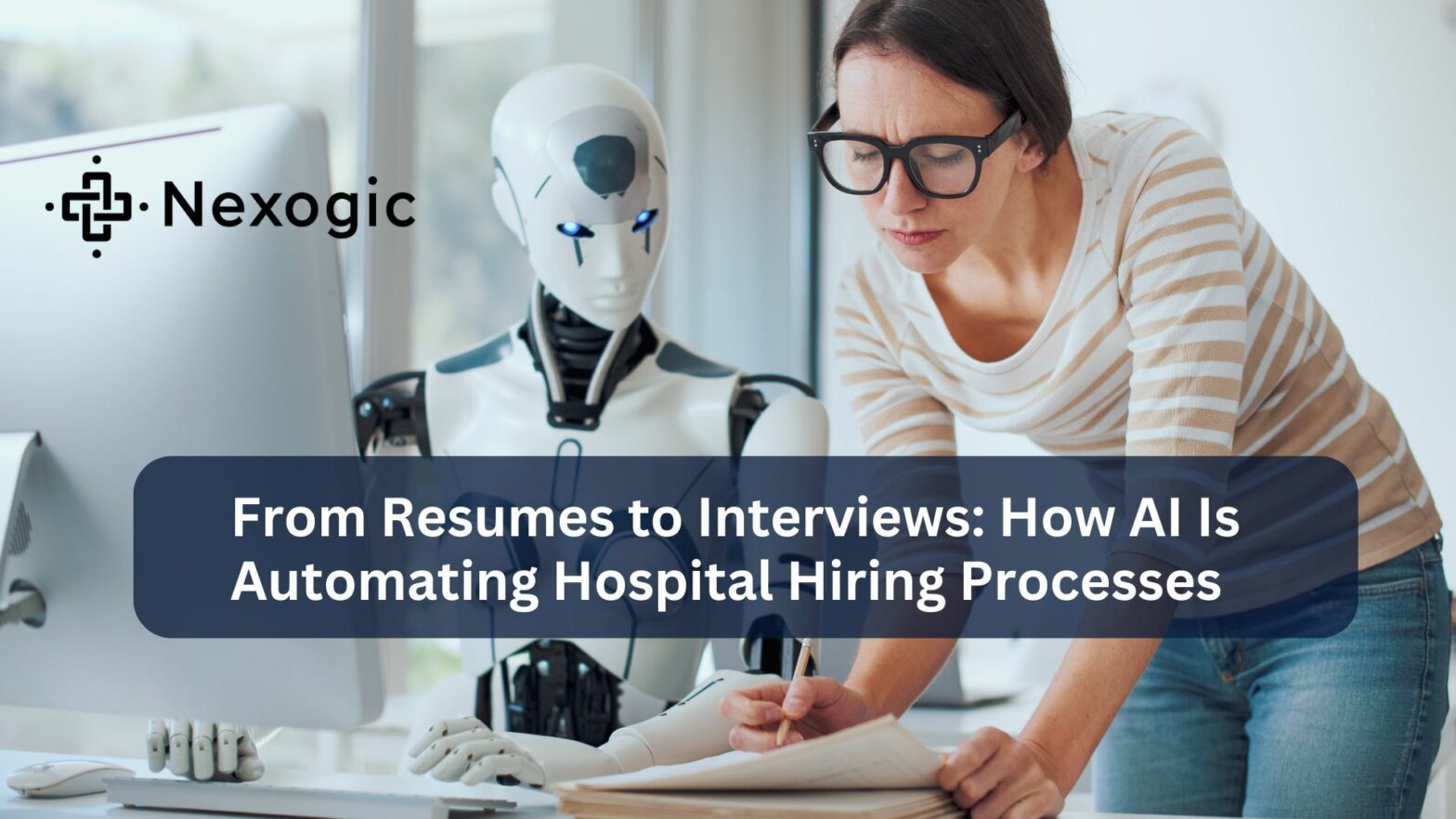From Resumes to Interviews: How AI Is Automating Hospital Hiring Processes
- May 9, 2025
- Nexogic

From Resumes to Interviews: How AI Is Automating Hospital Hiring Processes
The healthcare industry is in the middle of a quiet revolution, one driven by technology, speed, and precision. While hospitals have long focused on improving patient care with the latest in medical technology, the behind-the-scenes processes like Hospital Hiring have traditionally lagged behind.
However, with the increasing demand for qualified medical professionals, shrinking hiring windows, and rising attrition rates, hospital HR teams are turning to Artificial Intelligence (AI) to make smarter, faster, and more effective hiring decisions.
This blog explores how AI is automating the hospital hiring pipeline from resume screening to final interviews and why it matters now more than ever.
1. The Traditional Bottleneck in Hospital Hiring
Healthcare hiring is unlike other industries. A delay in filling positions such as doctors, nurses, radiologists, or lab technicians can directly affect patient outcomes. Yet, traditional hiring workflows are slow and often inefficient:
- Manual resume sorting consumes hours or even days.
- Poor job-candidate matching leads to high attrition.
- Scheduling interviews across departments is time-consuming.
- Biases in hiring decisions reduce workforce diversity.
These inefficiencies not only affect HR departments but also strain clinical staff and increase patient wait times.
2. Smart Resume Screening: AI as the First Filter
An AI-based ATS (Applicant Tracking Systems) can scan thousands of resumes in a minimal time it takes a human recruiter. These systems:
- Extract structured data from unstructured CVs, such as years of experience,
- qualifications, languages spoken, and sub-specializations.
- Rank candidates based on job description alignment.
- Flag inconsistencies in resumes, like employment gaps or mismatched credentials.
In Practice:
Platforms like Nexogic utilize digital CVs that are already structured for fast filtering. This allows hospital recruiters to bypass the tedious process of resume formatting and focus on decision-making.
3. Intelligent Candidate Matching: Beyond Skills
AI algorithms do more than look for keywords. They assess deeper layers of candidate suitability, including:
- Past job roles and transitions (e.g., shifting from government hospitals to private practice).
- Through NLP (Natural Language Processing) it process Soft skills and communication style.
- Location preferences and availability, important for time-sensitive or remote assignments.
This results in hyper-personalized recommendations, saving time and improving hiring accuracy.
4. AI-Powered Interview Scheduling and Chatbots
Coordinating interview schedules among department heads, panel members, and candidates is another challenge. AI tools now automate this process:
- Calendar integration to find mutual availability.
- Automated email/WhatsApp reminders.
- AI chatbots for conducting pre-interviews with questions tailored to the role.
Some advanced systems even conduct video interviews, analyzing facial cues, tone, and response quality generating a performance score for each candidate.
5. Reducing Human Bias Through AI
Bias in hiring conscious or unconscious is a real problem in many sectors, including healthcare. AI can help reduce this by:
- Anonymizing resumes to hide names, gender, or ethnicity.
- Using data-driven scoring models for evaluation.
- Providing consistent question frameworks in interviews.
Of course, the key is ensuring that AI itself is trained on unbiased data, which requires continuous monitoring and refinement.
6. Real-Time Analytics and Feedback Loops
Post-interview, AI tools can provide:
- Interview summaries and sentiment analysis.
- Fitment scores comparing the candidate to past successful hires.
- Feedback integration from interviewers across departments.
Over time, AI learns from hiring outcomes (successful vs. failed hires), improving the quality of future recommendations.
7. Use Case: How Nexogic Is Leading Hiring in Healthcare
Nexogic is at the forefront of digitizing healthcare recruitment in India. With a network of doctors, hospitals, and medical students, the platform offers:
- Hiring job matching based on specialty, location, and salary expectations.
- Digital CV creation tools for doctors to enhance discoverability.
- One-click job applications for faster conversions.
WhatsApp and email-based communication workflows for recruiter-candidate engagement.
Nexogic verified digital profiles first approach reduces hiring timelines from weeks to days and ensures hospitals don’t miss out on top talent due to process delays.
Conclusion: The Future of Hospital Hiring Is AI-Driven
AI is empowering the HR Team, not replacing them. In the high-stakes environment of healthcare, where every hire counts, automation brings speed, precision, and fairness to the recruitment process.
Hospitals that adopt AI in hiring stand to gain:
- Shorter hiring cycles.
- Better quality hires.
- Lower recruitment costs.
- Higher workforce stability.
As platforms like Nexogic continue to evolve, the fusion of healthcare and hiring tools will only grow stronger benefiting not just hospitals and doctors, but ultimately, the patients they serve.


